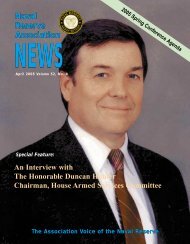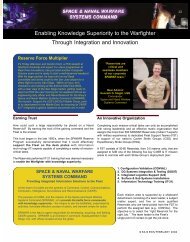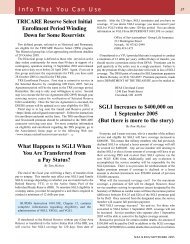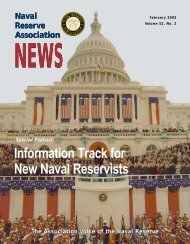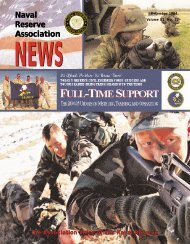Naval Reserve Association
Naval Reserve Association
Naval Reserve Association
You also want an ePaper? Increase the reach of your titles
YUMPU automatically turns print PDFs into web optimized ePapers that Google loves.
8Retirees’ CornerBeing an Organ DonorCDR Sharon K. Kleinschmidt, USNR (Ret)National VP for Retired PersonnelThe establishment of the U.S.Navy Tissue Bank in 1949 providedour nation its first bone and tissueprocessing and storage facility.You only need to read one statisticto know the great need for organdonation: Every 85 minutes, anAmerican dies because his/her bodycould wait no longer for a neededorgan transplant. However, on thebrighter side, about 74 people live becausethey receive an organ transplant.Only a portion of eligible donorsactually pledge to donate. Why? It maybe hard to believe but some believe themyth that if emergency room doctorsknow that you are a donor, they will notwork as hard to save your life. Imagine, intoday’s advanced society, someone’s mindcould momentarily drop so low on theintelligence scale to believe something soridiculous. Another reason for shyingaway from organ donation is religion.However, every major religion in theUnited States supports the donation oforgans and tissue for transplants,considering it a personal decision.Don’t cut yourself short about being anorgan donor. Regardless of age or medicalhistory, you can be a potential organ,tissue, or eye donor. Almost every donorwill have something of value to makelife better for someone else. Today, it ispossible to transplant about 25 differentorgans and tissues, including heart, liver,kidney, pancreas, lungs, bone cartilage,skin, and corneas.If you make the personal decision tobecome an organ donor, don’t keep thatdecision a secret. Make your wish knownby:— Telling your family; they need toknow. Organ and tissue donation isalways discussed with family membersprior to donation.— Having your driver’s license indicatethat you are a donor.— Informing your family doctor andclose friends.— Including your desire in personaldirectives, living wills, and wills.— Carrying something identifying youas an organ donor.I am willing to bet that there are<strong>Association</strong> members who are alive todaybecause someone was an organ donor.Organ donation is a positive, two-sidedcoin. Donation not only saves lives, butalso allows a little piece of those who areno longer with us to go on living. Registerto be an organ donor. It’s all about savinga life.Age 60The Age 60 Through 65 TimelineBy Tom McAteeRetired pay and benefits commence. The first direct deposit to your account will be on the first workingday of the month following your birthday. New ID cards, reflecting retired with pay status, required for youand eligible family members. Your spouse’s new ID card will expire in the month prior to him/her reaching age 65. You and eligibledependents are automatically enrolled in TRICARE Standard if you properly applied for retired pay benefits through the <strong>Naval</strong><strong>Reserve</strong> Personnel Center in New Orleans. You may apply for TRICARE Prime only after reaching age 60, not before.Age 62First opportunity to opt-out of the Survivor Benefit Plan. Must submit SBP Termination Request (DDForm2656-2) with spouse concurrence. You have until the day before turning age 63 to opt-out of the plan.Your first opportunity for Social Security benefits at the reduced rate. You will need your DD214 when applying.Age 63Age 64Age 65The day before turning age 63 is your last opportunity for opting out of the SBP program. Once out of theprogram, no reentry is authorized, not even during an open season.The <strong>Association</strong> will send you a letter on your 64th birthday reminding you of several items that will occurat age 65.TRICARE Standard, Extra, or Prime end the last day of the month before the month you turn age 65.TRICARE continues for any family member until he/she turns age 65. MEDICARE begins the first day ofthe month in which you turn age 65. TRICARE for Life (TFL) begins on the same day as Medicare, provided you are coveredunder Part B. TFL now becomes the second payee after Medicare. Normally, no supplemental insurance is required at this point.New spouse ID card required upon spouse reaching age 65. You, as the retired member, do not need to renew your ID card.NRA NEWS/SEPTEMBER 2005



